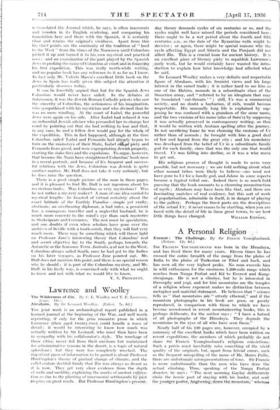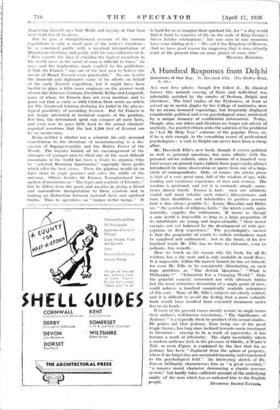A Personal Religion - SIR FRANCIS YOUNGIIUSBAND was born in the
Himalaya, and has lived there for many years., Eleven times Ile has crossed the entire breadth of the- range from the plains of India to the plains of Turkestan or Tibet and back, and has seen all, the very highest peaks. No man exceeds him in wild enthusiasm for the enormous 1,200-mile range which reaches from Nanga Parbat and K2 to Everest and Kang- chenjunga. He is not a climber, but he is interested in theosophy and yogi, and for him mountains are the temples of a religion whose exponent.. makes no distinction between metaphor and material statement. He believes that " eience tells us " that mountains are. " utterly ethereal," and. if the mountain photographs in7. his book are poor, or poorly reproduced, in comparison with those to which we have become accustomed in .recent mountaineering books, this is perhaps deliberate, for the author says : " I- have -a hatred of all photographs of -the Himalaya. They degrade the mountains in the eyes of all who have seen them."
Nearly half of his 240 pages are, however, occupied by a summary of the excellent books which have been written on recent expeditions, the members of which probably do not share Sir Francis Younghusband's religious convictions. Such a precis must inevitably miss something of the vivid quality of the originals, but, apart from trivial errors, such as the frequent misspelling of the name of Mr. Marco Pallis, there are unfortunate misrepresentations of tone. Sir Francis is more melodramatic than the men who have done the actual climbing. Thus,- speaking of the Nanga Parbat disaster, lie Says " The next morning Gaylay deliberately chdse the heroic part of staying with his leader, and sent the _younger porter,Anstserittvdmillwasountain," whereas
Angtsering himself says that Merkl and Gaylay at that time were both too ill to move.
But to give a straightforward account of the various expeditions is only a small part of the writer's intention : he is concerned partly with a mystical interpretation of Himalayan climbing, and partly with his own influence on it. " How exactly the idea of climbing the highest mountain in the world arose in the mind of man is difficult to trace." he says, and the implication, made explicit by his publishers, is that Sir Francis " was one of the first men to believe the ascent of Mount Everest even practicable." No one doubts the financial and diplomatic value of his efforts on behalf of the early Everest expedition, but it might have been tactful to place a little more emphasis on the pioneer work of men like Johnson, Graham, Freshfield, Kellas and Longstaff, some of whom Sir Francis does not even mention, and to point out that as early as 1892 Clinton Dent wrote an article for The Nineteenth Century declaring his belief in the physio- logical possibility of ascending Everest. But Sir Francis is not deeply interested in technical aspects of the problem. For him, the determined spirit can conquer all ,mere facts, and even now he pays little heed to the actual climbers' repeated assertions that the last 1,200 feet of Everest are by no means easy.
Being neither a climber nor a scientist, his only personal contribution to the literature of mountaineering is a dis- cussion of Suprapersonality and the Motive Power of the World. The impulse behind all his encouragement of the attempts of younger men to climb one of the most difficult mountains in the world has been a desire to organise trips to " selected Mountain Sanctuaries," especially those peaks which offer the best views. There the pilgrims would sit on tiger skins in yogic postures and solve the riddle of the universe. Others besides Sir Francis Younghusband have spoken of mountains as " The types and symbols of Eternity," but he differs from the _poets and mystics in giving a literal and materialistic interpretation to these symbols and in'. making no distinction between material facts and spiritual truths. Thus he speculates on " higher stellar beings." It
• is hard for us to imagine their spiritual life, for " a slug would find it hard to conceive of life on the scale of King George's _Silver Jubilee celebrations," but rare men in rare moments have some inkling of it : " We call it the Kingdom of Heaven. And we have good reason for supposing that it does actually . exist at the present time on some planet of some star."
livItcnutti. ROBERTS.













































 Previous page
Previous page